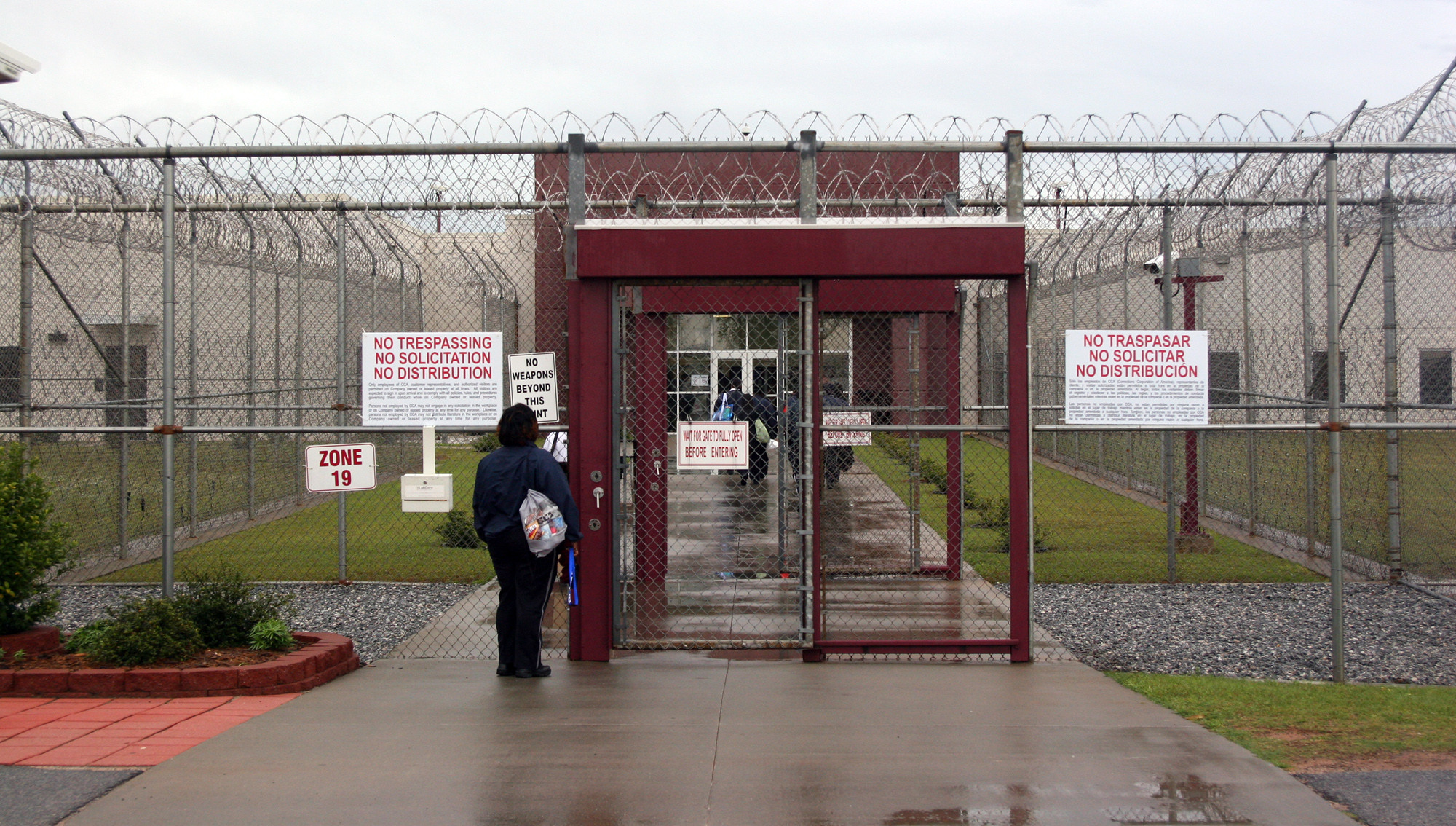Private U.S. Detention Center Punishes Immigrants for Refusing to Work, Intercept Reports
One detainee tells of being held in solitary confinement for encouraging others to stop participating in a labor program that is supposed to be voluntary. An employee waits at the gate of the Stewart Detention Facility, a Corrections Corporation of America immigration facility in Lumpkin, Ga. (Kate Brumback / AP)
An employee waits at the gate of the Stewart Detention Facility, a Corrections Corporation of America immigration facility in Lumpkin, Ga. (Kate Brumback / AP)
A privately run U.S. Immigration and Customs Enforcement detention center in rural Georgia forced a detainee into solitary confinement after he encouraged other detainees to stop working in a labor program, although ICE claims the program is voluntary, according to The Intercept.
The news organization reports that those in ICE custody often work for just $1 per day.
Shoaib Ahmed, 24, came to America to escape political persecution in Bangladesh, where he participated in the primary opposition party of what many viewed as the country’s authoritarian government.
Upon arriving in the U.S., Ahmed was held in a detention center, where he has been for more than a year. He says he was forced to work in ICE facilities and punished with solitary confinement when he refused. He is now in the process of being deported.
The Intercept reports:
Ahmed’s account adds to a growing chorus of ICE detainees who allege that they have been forced to work in for-profit ICE facilities or else risk punishment with solitary confinement — a harsh form of captivity that, if prolonged, can amount to torture. Late last month, ICE detainees at a CoreCivic-run facility in California sued the private prison contractor, alleging that they had been threatened with solitary confinement if they did not work. In October, The Intercept reported that officials had placed another detainee in solitary confinement for 30 days for “encouraging others to participate in a work stoppage” at the same privately run facility where Ahmed was disciplined, the Stewart Detention Center in Lumpkin, Georgia.
CoreCivic has said that its practices of segregating detainees in individual cells are humane and has disputed the term “solitary confinement,” arguing that its harsh connotation does not apply to the publicly traded firm’s practices. “Use of the term in your coverage with regard to Stewart would give readers a false impression of the reality of restricted housing at the facility,” CoreCivic spokesperson Jonathan Burns said in an email.
But over the course of two interviews with The Intercept over a fuzzy detention center phone line, Ahmed used rudimentary English to describe being subjected to the isolating conditions of solitary confinement as it is generally understood. “The room is at all times locked,” Ahmed said. “If you talk, the sound does not go outside. And nobody comes to talk with us.”
“Sometimes I think I will be mentally sick,” Ahmed said of his time in isolation. “I feel pain in my head.”
In addition to severe isolation, Ahmed spoke of being subjected to restrictive treatment in segregation that might be more expected for a violent and volatile criminal than for an immigration detainee under punishment for encouraging a work stoppage.
Once a day, detention center officers would handcuff Ahmed and escort him outdoors for an hour in a recreation yard — which he described as a “cage” for one person. Three times a week, Ahmed and other detainees in solitary confinement were given the opportunity to shower. This meant being guided in handcuffs from his isolation cell to an individual shower room. “They push you into the shower room and then open the handcuffs,” Ahmed said, adding: “You take a shower and after that, you come back in your room. Then they put you back in the room. When you enter the room again, they open the handcuffs.”
Ahmed said that because no one outside his room could hear him talk at a regular volume, his only opportunity for human interaction would often be to shout out, though he was prohibited from raising his voice — an infraction that would only cause his sentence in isolation to be extended. “Sometimes I think my head is not working, and I think I want to loudly call them: ‘Release me. Please, take me to some open site,’” Ahmed recalled. “Sometimes I think the segregation will kill me.”
According to the website Endisolation.org, the U.S. operates the largest immigration detention infrastructure in the world, with between 380,000 and 442,000 people detained per year.
Your support matters…Independent journalism is under threat and overshadowed by heavily funded mainstream media.
You can help level the playing field. Become a member.
Your tax-deductible contribution keeps us digging beneath the headlines to give you thought-provoking, investigative reporting and analysis that unearths what's really happening- without compromise.
Give today to support our courageous, independent journalists.






You need to be a supporter to comment.
There are currently no responses to this article.
Be the first to respond.